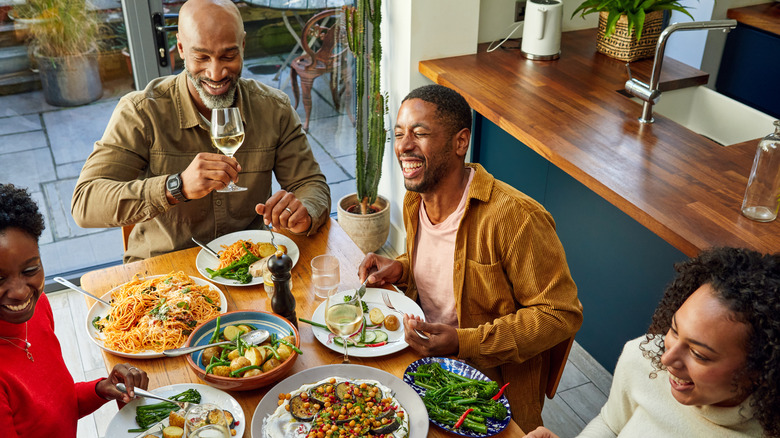Are Dinner And Supper The Same Thing?
If you've ever been invited to supper but showed up expecting dinner, or vice versa, you might have stumbled into a debate that's more cultural than culinary. While many use the terms interchangeably, especially in modern times, their histories and regional differences tell a different story. The question of whether dinner and supper are the same thing is one of tradition, timing, and even geography. Spoiler alert: they are, in fact, not exactly identical.
The terms "dinner" and "supper" date back centuries, with roots in different social and cultural practices. For some, dinner represents the largest, most formal meal of the day, while supper carries a more casual, end-of-day vibe. But how they're used today can vary wildly depending on where you are and whom you ask. Whether it's a Southern supper, a late dinner you readied first thing in the morning, or even a waffle supper (yes, that's a thing!), these words carry unique meanings that are worth exploring. So, what's really the difference? Let's dig in.
The differences between dinner and supper
The distinction between dinner and supper often boils down to timing and tradition. Historically, dinner was considered the main meal of the day, served midday in agrarian societies where people needed sustenance for a hard day's work. Supper, on the other hand, referred to a lighter, evening meal to close out the day. Over time, as work schedules shifted and urban living became the norm, dinner moved to the evening for many people, especially in the United States.
Today, the terms can reflect regional differences. While some point out "supper" to be more commonly used in rural and Southern areas of the country to describe an informal evening meal, others note that "dinner" is now broadly used to describe both formal meals and evening dining across the United States, making the term almost interchangeable. However, supper still reigns supreme as the preferred term in parts of the South, often conjuring images of fried chicken, cornbread, and casseroles served around a family table.
Cultural influences also play a role. For example, in the Midwest, many families still refer to lunch as "dinner" and the evening meal as "supper," reflecting an older tradition. Beyond timing and formality, the two terms showcase how our language and eating habits have evolved over centuries. We have even highlighted quirky traditions like the waffle supper, further blurring the lines between casual and hearty meals.
So what's on the menu?
Regardless of whether you call it supper or dinner, the term you use often depends on your upbringing and lifestyle. In modern North American culture, dinner has largely taken over as the go-to term for the last meal of the day, though "supper" still holds its charm in specific regions and social circles. It's not just about the words, though, it's about the shared experience. No matter when you eat dinner in America, families take the lead on this nightly tradition to accommodate the important meal around busy modern schedules. The list of benefits gained from eating as a family or with friends are numerous: stronger connection, stress relief, and healthier and more diverse eating habits, among many others.
The essence of the meal remains the same: connection, conversation, and, yes, also nourishment. Just be careful when using the terms interchangeably. It might spark a lively debate at the table!


